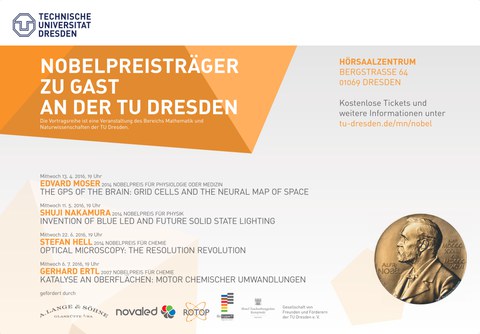Apr 04, 2016
Nobel Laureates at TU Dresden

Vortragsreihe Nobelpreisträger
Four Nobel Laureates will give a public talk at TU Dresden in the summer term 2016.
In April, the School of Science launches its interdisciplinary lecture series “Nobel Laureates at TU Dresden”. The Nobel Laureates from the fields of physiology or medicine, chemistry and physics will talk about their pioneering research that is, according to Alfred Nobel, “for the greatest benefit to mankind”.
On April 13, the Norwegian neuroscientist Edvard Moser opens the series with his talk “The GPS of the brain: Grid cells and the neural map of space”. Moser was awarded the Nobel Prize in Physiology or Medicine 2014 together with his wife May-Britt Moser and the British-American neurologist John O’Keefe for the research of the brain’s positioning system. He is the director of the Institute for Systems Neuroscience at the University Trondheim (Norway), where he has been working together with his wife May-Britt for many years. Their joint work culminated in the discovery of so-called grid cells, which, in joint action with other cells, form the “GPS system” in our brain.
On May 11, the Japanese-born American material scientist Shuji Nakamura talks about the „Invention of blue LED and future solid state lighting“. Nakamura was awarded the Nobel Prize in Physics 2014 together with the Japanese researchers Isamu Akasaki and Hiroshi Amano for the development of blue light-emitting diodes (LEDs). The development of blue LEDs was the prerequisite for the production of white light using the combination of red, green and blue LEDs and thus, the basis for efficient, energy-saving light sources used world-wide.
On June 22, Stefan Hell, the director of the Max Planck Institute for Biophysical Chemistry in Göttingen and head of the Division of Optical Nanoscopy at the German Cancer Research Center (DKFZ) in Heidelberg will speak about “Optical microscopy: the resolution revolution”. He was awarded the Nobel Prize in Chemistry 2014 "for the development of super-resolved fluorescence microscopy". Hell has succeeded in exceeding the limitations of optical microscopy and thus, in laying foundations for optical nanoscopy. He developed the so-called “Stimulated Emission Depletion” (STED-) microscopy, which uses fluorescence to make nanoscale biological structures visible by chemical processes.
A further breakthrough in chemistry was realized by the German physicist and chemist Gerhard Ertl with his studies of chemical processes on solid surfaces. On July 6, the Nobel Laureate in Chemistry of 2007 will give a talk in the German language with the title “Katalyse an Oberflächen: Motor chemischer Umwandlungen”. With his work, Gerhard Ertl, the Emeritus director of the Fritz Haber Institute of the Max Planck Society in Berlin, created the basis for the understanding of industrial catalysts and catalytic processes. His fundamental research is still widely used, such as in the production of chemical fertilisers, of efficient catalytic converters or in the explanation of climatic phenomena.
All four talks will take place on a Wednesday evening, 7 p.m. at the Hörsaalzentrum (HSZ) of TU Dresden and are opened to everybody interested. For more information and free registration to the talks go to https://tu-dresden.de/mn/nobel
In additions to their talks, the Nobel Laureates will offer invited young researchers the opportunity for discussion in a more personal format. In these discussion rounds, the young scientists will have the unique chance to interact with a Nobel Laureate and to get “first hand” motivation for their own scientific careers.
List of all four public talks:
Wednesday, 13.04.2016, 7 p.m.
Edvard Moser - 2014 Nobel Prize in Physiology or Medicine
The GPS of the brain: Grid cells and the neural map of space
Wednesday 11.05.2016, 7 p.m.
Shuji Nakamura – 2014 Nobel Prize in Physics
Invention of blue LED and future solid state lighting
Wednesday 22.06.2016, 7 p.m.
Stefan Hell – 2014 Nobel Prize in Chemistry
Optical microscopy: the resolution revolution
Wednesday 06.07.2016, 7 p.m.
Gerhard Ertl – 2007 Nobel Prize in Chemistry
Katalyse an Oberflächen: Motor chemischer Umwandlungen
The lectures take place at Hörsaalzentrum (HSZ, Bergstrasse 64, 01069 Dresden) at TU Dresden.
Information for journalists:
Nicole Gierig
Public Relations Advisor
School of Science
Technische Universität Dresden
01069 Dresden
Tel.: +49 (0) 351 463-33 013
